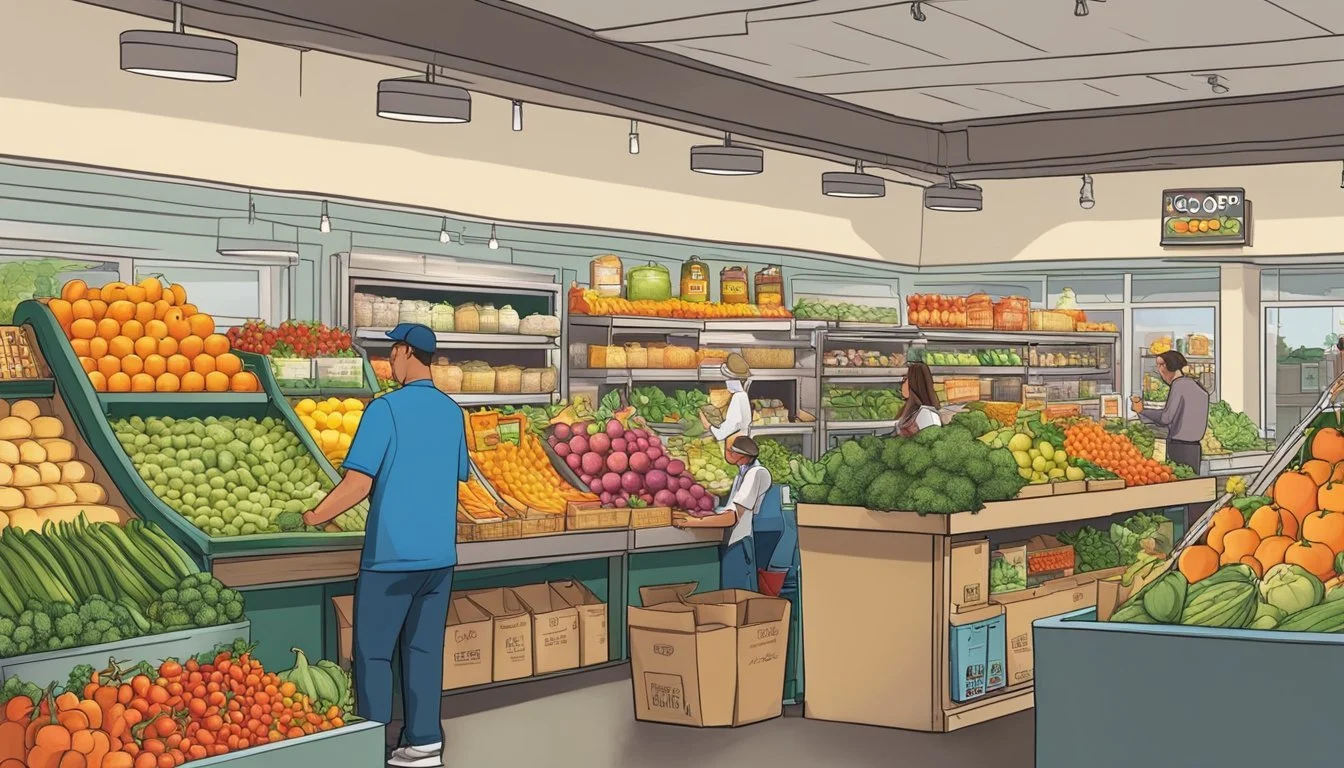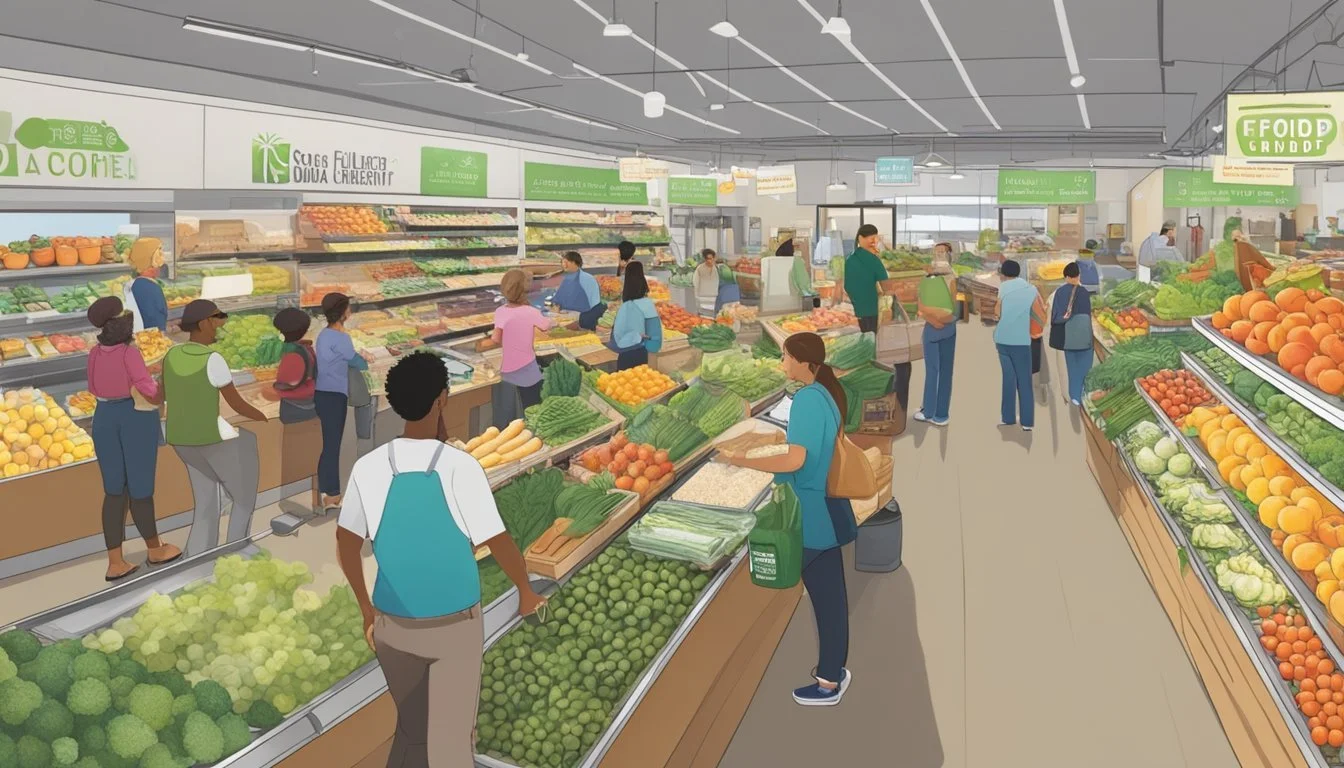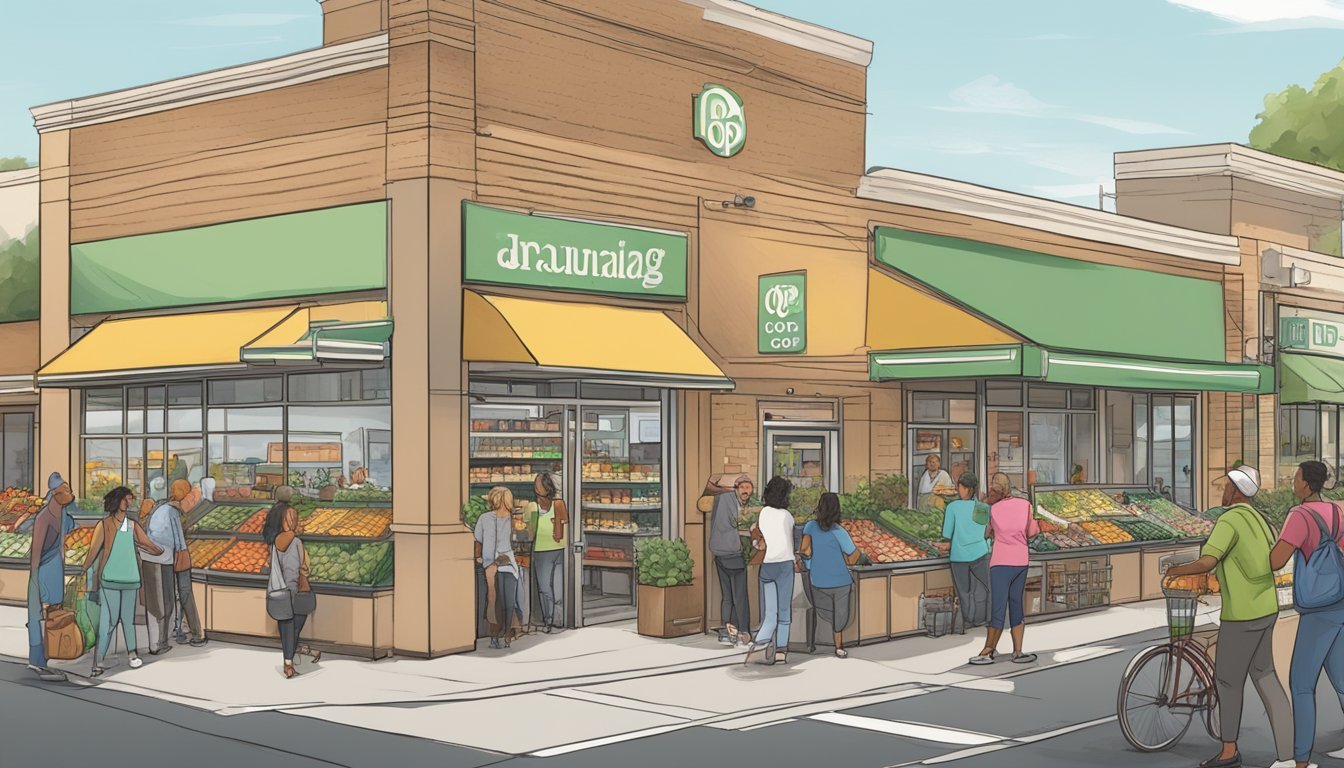Guide to Food Co-Ops in Fullerton, CA
Your Local Shopping Resource
Food cooperatives, commonly known as food co-ops, have become integral components of local community economies, especially in areas like Fullerton, California. These member-owned and operated establishments are not just commercial hubs but centers for health- and eco-conscious individuals who prioritize local, often organic, produce and goods. In Fullerton, these food co-ops are distinguished by their commitment to providing nutritious food options while also supporting the area’s agricultural producers, reinforcing both the local economy and a sustainable food ecology.
The Heart of Downtown Food Co-Op holds a notable presence in Fullerton and has been serving the community since 2007. This particular co-op emphasizes its mission of improving quality of life for families who struggle to procure sufficient food and necessities. By operating on a not-for-profit basis, food co-ops like this one manage to keep prices fair and accessible while also fostering a spirit of volunteerism and community support. Their focus on food distribution ensures that families in need can access essential groceries, which often include fresh, natural, and organic food sources.
Given their unique structure and purpose, food co-ops in Fullerton are not only places to shop but are also social enterprises that contribute to the well-being of their community. They encourage local involvement and provide a space where individuals can both contribute to and benefit from the cooperative's resources. The presence of food co-ops in this California city is a testament to Fullerton's dedication to fostering a healthful and collectively nourished community.
Understanding Food Co-Ops
In Fullerton, CA, food co-ops present a unique approach to grocery shopping, emphasizing community ownership and shared values. They put service and membership at the forefront to support local economies and provide healthy food options.
Definition and Principles
A food co-op is a cooperative business that operates on a member-owned and governed model, which focuses on providing service and value to its members over profit. These cooperatives uphold a set of principles that differentiate them from traditional grocery stores. These principles typically include:
Voluntary and Open Membership: Co-ops are open to all individuals without gender, social, racial, political, or religious discrimination.
Democratic Member Control: They are controlled by their members, who actively participate in setting policies and making decisions.
Member Economic Participation: Members contribute equitably to, and democratically control, the capital of their cooperative.
Autonomy and Independence: Co-ops are autonomous, self-help organizations controlled by their members.
Education, Training, and Information: Co-ops provide education and training for their members and the public to contribute effectively to the development of their cooperatives.
Cooperation among Cooperatives: Co-ops serve their members most effectively by working together.
Concern for Community: While focusing on member needs, co-ops work for the sustainable development of their communities.
Benefits of a Food Co-Op
Members of a food co-op enjoy several benefits due to the cooperative's structure. These benefits can include:
Ownership: Members have a say in the operations and decisions of the food co-op, giving them direct control over the products and services.
Value: Because co-ops are not primarily profit-driven, they can focus on offering high-quality products that deliver value to their members.
Local Economic Support: Co-ops often support local growers and producers, which helps to invigorate the local economy and sustain livelihoods.
Community Engagement: Members can feel a sense of belonging and community as they are part of a group effort to provide a needed service.
Getting Started with Food Co-Ops
In Fullerton, CA, food co-ops offer community members a unique opportunity to become part-owner in a local grocery business, which can lead to various benefits.
How to Become a Member
To join a food co-op in Fullerton, an individual typically purchases a share. This share represents a piece of ownership in the cooperative and grants the member voting rights. Here's a general process:
Visit the Food Co-op: Potential members should first visit the local co-op to get acquainted with its operations and offerings.
Inquire About Membership: Interact with current member-owners to learn about their experiences and gather details on membership specifics.
Purchase a Share: If one decides to join, they must buy a share at a price set by the co-op, which is often a one-time payment, making them a part-owner.
Exploring Membership Benefits
Becoming a member of a food co-op comes with several advantages. Among these are:
Savings and Discounts: Members may receive discounts on groceries and special member-only offers.
Services: Access to a range of services, like workshops or community events, is often part of the membership package.
Engagement: They can participate in decision-making processes, influencing services and product offerings.
Each member's contribution strengthens the co-op's ability to serve the Fullerton community efficiently and sustainably.
Food Selection and Sourcing
Food co-ops in Fullerton, CA focus on providing a diverse array of fresh, quality foods with an emphasis on local and organic products. They cater to various dietary needs, offering everything from fresh produce to dairy and meat products.
Local and Organic Produce
Food co-ops in Fullerton prioritize local and organic fruits and vegetables to ensure customers have access to the freshest and most sustainable options. By sourcing from local farms, these co-ops support the community and reduce environmental impact.
Vegetables: A variety of leafy greens, root vegetables, and seasonal specialties.
Fruit: Seasonal selections such as citrus, berries, and stone fruits.
They often build direct relationships with growers to maintain a supply of organic produce that meets consumers' expectations for both taste and quality.
Meat, Dairy, and Eggs
Quality and sourcing are also paramount when it comes to meat, dairy, and eggs at Fullerton's food co-ops. Customers can find a range of products that are both health-conscious and ethically sourced.
Meat: Includes selections of beef, poultry, pork, and occasionally lamb or game, focusing on hormone-free and responsibly-farmed options.
Dairy and Eggs: Offerings typically include artisan cheeses, various milk, yogurt, and a selection of farm-fresh eggs.
The food co-ops ensure that these perishable goods come from sources that adhere to high standards for animal welfare and sustainable farming practices.
Economic Impact
Food co-ops in Fullerton, CA, serve as critical nodes that bolster local economies by connecting consumers directly with regional farmers and producers, fostering economic growth through localized commerce.
Supporting Local Agriculture
Food co-ops often partner with local farmers to provide fresh, farm-to-table produce to their members. They often emphasize the economic benefits of these partnerships, which generally include:
Strengthening Local Economies: By purchasing directly from local farmers, co-ops inject money directly into the local economy, supporting the agricultural sector and associated businesses.
Creating Economies of Scale: As co-ops aggregate demand for local crops, they enable farmers to plan and plant with assured markets, spreading out costs and improving income stability.
Financial Advantages for Members
Members of food co-ops typically enjoy several financial perks that stem from the structure and operation of these cooperative models:
Member Profits: Profits are often shared among members in the form of dividends or reduced prices, directly affecting their personal finances positively.
Cost Savings: Collective buying power frequently leads to lower prices on goods, as the co-op can negotiate from a position of strength with wholesalers and producers.
By directly involving members and local farmers in the sustenance of the cooperative, food co-ops in Fullerton manifest a compounding positive effect on the local economy.
Operational Structure
In Fullerton, CA, food co-ops typically feature a democratic operational structure that clearly defines the roles of management and workers, as well as the governance responsibilities of the board of directors. These elements are critical in ensuring the co-op serves its members effectively.
Management and Worker Participation
Fullerton food co-ops often operate on a model where both management and workers play pivotal roles in the day-to-day operations. Management is responsible for overseeing the functional aspects of the co-op, such as product sourcing, financial health, and store maintenance. However, in a worker-owned co-op, employees have a unique opportunity to contribute to decision-making processes, which fosters a sense of ownership and responsibility.
Worker engagement is usually structured as follows:
Regular staff meetings for updates and feedback
Involvement in new product selections and services
Participation in strategy sessions
Board of Directors and Governance
The Board of Directors serves as the governing body of a food co-op in Fullerton. Members are elected by the co-op's shareholders and are tasked with upholding the cooperative's mission and financial stability. Governance includes strategic planning and ensuring the co-op adheres to legal and ethical standards. The board also facilitates communication between the management, workers, and the wider co-op membership.
Key governance practices include:
Monthly board meetings to review operations, finances, and member concerns
Annual general meetings for major decisions and board elections
Clear policies for labor management and dispute resolution
The board ensures that the principles of cooperative governance and member control are central to the co-op’s operations.
Shopping Experience
In Fullerton, California, food co-ops provide a unique shopping experience that caters to diverse consumer needs through a varied atmosphere, product range, and inclusive customer service.
Atmosphere and Product Diversity
The food co-ops in Fullerton boast an inviting atmosphere that reflects their community-oriented spirit. Shoppers can find a diversity of products, from local organic produce to artisanal goods, ensuring that there is something for every palate and dietary need. The aisles are typically filled with vibrant colors, from the fresh greens of locally grown vegetables to the rich hues of seasonal fruits, creating a visually appealing shopping environment.
Products: Fresh fruits, vegetables, free-range eggs, and grass-fed meats
Origin: Sourced from local farmers and producers
Customer Service and Inclusivity
Their commitment to customer service is evident through knowledgeable staff who are ready to assist with any inquiries, contributing to a positive service experience. Co-ops are not just a grocery store; they foster inclusivity, welcoming individuals of every gender, background, and dietary preference. By involving members in decision-making, food co-ops ensure that they serve the broader community, adapting their services and products to meet the needs of their users.
Staff: Knowledgeable and helpful
Member Involvement: Key in decision-making regarding services and products offered
Community Engagement
Food co-ops in Fullerton, CA, strive to foster a strong sense of community by providing educational resources and engaging in local events and partnerships. They serve as a vital link between residents and a sustainable food system, promoting knowledge sharing and support within the local area.
Educational Resources
Food co-ops often serve as a hub for learning opportunities within the local community. They provide services and resources aimed at educating members and non-members alike about healthy eating habits, sustainable agriculture, and the benefits of supporting local businesses. For instance, the Heart of Downtown Food Co-Op may offer workshops on nutrition or cooking classes, teaching participants how to prepare meals using fresh, locally-sourced ingredients.
Local Events and Partnerships
The relationship between food co-ops and the local community is strengthened through various events and partnerships. Food co-ops typically collaborate with local businesses, schools, and civic organizations to organize events such as food drives, farmer’s markets, or holiday-themed gatherings, all designed to promote community involvement and support for the co-op’s mission. By engaging in these partnerships, food co-ops reinforce their commitment to serving the needs of Fullerton families and individuals, contributing to a resilient and interconnected community.
Frequently Asked Questions
In this section, readers will find succinct answers to common inquiries about membership and products at the Fullerton, CA food co-ops.
Membership Queries
Q: How does one become a member of a Fullerton food co-op?
A: To become a member, individuals must purchase a share, which typically involves a one-time fee. In Fullerton, for instance, the contribution might be similar to the $200 member share required by the Hillsboro Food Co-op.
Q: Can membership shares be withdrawn or donated?
A: Members may have the option to withdraw their shares and receive a refund by providing a signed, dated request. Shares can often be donated as well, supporting community accessibility to co-op membership.
Product Inquiries
Q: What types of products are offered by Fullerton food co-ops?
A: Fullerton food co-ops commonly provide a variety of groceries including produce, dairy, canned goods, dried items, and frozen goods. These products reflect the community's preferences and are sourced from potential suppliers identified through thorough research.
Q: Are there any hot meals available at the co-ops?
A: Not typically. For example, The Heart of Downtown Food Co-Op mentions that no hot meals are served, focusing instead on distributing groceries at set times.
Evaluating Environmental Impact
Food co-ops in Fullerton, CA, prioritize minimal environmental impact through various strategies. They often focus on supplying locally grown food, which reduces carbon emissions associated with long-distance transportation. The emphasis on locally sourced products not only supports regional farmers but also lessens the ecological footprint of distribution networks.
Locally Grown Food:
Reduction in Transport: Food co-ops connect consumers with food grown within their vicinity, cutting down on fuel consumption and greenhouse gas emissions.
Seasonal Selections: Offering seasonal produce encourages sustainable agricultural practices and preserves local biodiversity.
Distribution Efforts:
Efficient Logistics: Co-ops strive to streamline distribution to diminish energy usage and curb operational emissions.
Bulk Purchasing: By allowing consumers to purchase staple items in bulk, co-ops help reduce the demand for single-use packaging materials.
Supply Chain:
Co-ops have cultivated partnerships with suppliers who are committed to sustainable practices. This collaboration often extends to sharing resources to further reduce the aggregate environmental impact.
Operating Costs:
Co-ops typically operate on tight margins and consider the environmental impact of their operations. Energy-efficient lighting and refrigeration units are commonly used to decrease electricity consumption, reflecting in both reduced operating costs and a lower environmental footprint.
By evaluating each aspect of their operation through the lens of environmental sustainability, food co-ops in Fullerton contribute to a more eco-friendly food system. Their efforts demonstrate a commitment to ecological conscientiousness which resonates with the values of their community members.








